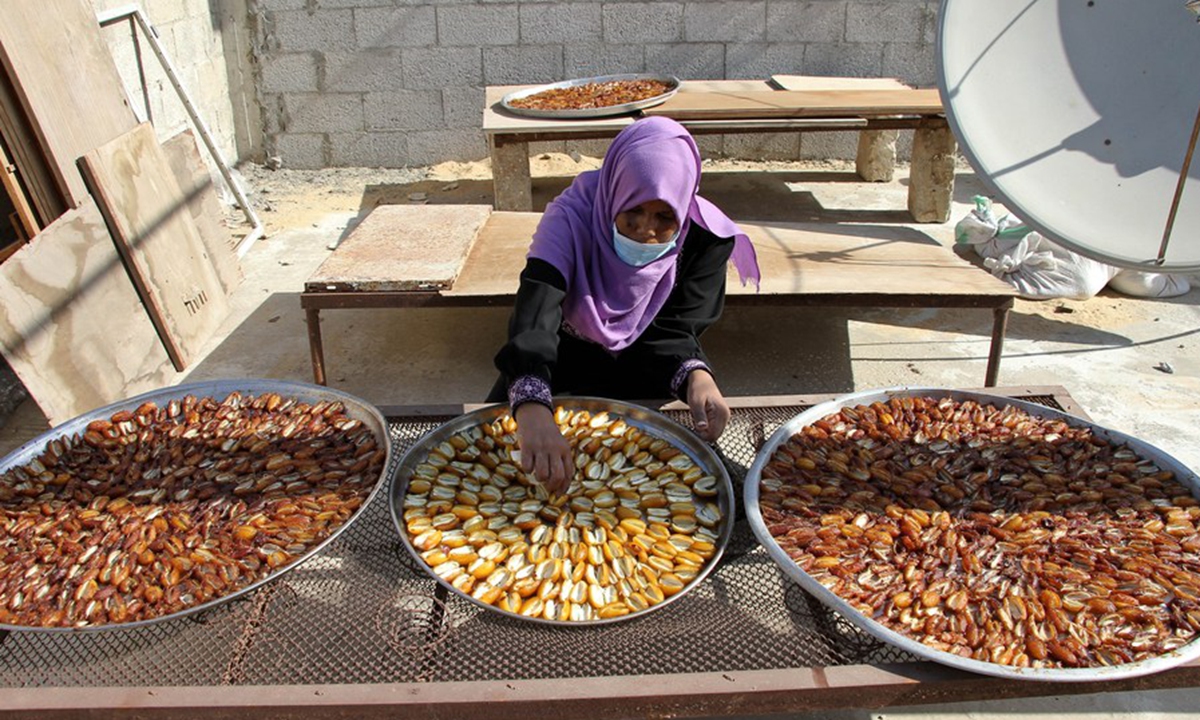Palestinian women raise family by making dates products in Gaza
Source: Xinhua Published: 2020/10/26 11:10:33

A Palestinian woman spreads dates to dry before packaging inside their house in Dir Al Balah city, central Gaza Strip, on Oct. 22, 2020. (Photo by Rizek Abdeljawad/Xinhua)
Amal Abu Sbitan, a Palestinian woman from Deir al-Balah in the central Gaza Strip, spends about 12 hours per day to make dates products with her neighbors.
The 45-year-old mother of three spends the dates season in making related products in a bid to make enough money for her family to last for the whole year.
Being the only breadwinner of her family, she produces about 900 kg of pressed dates; two-thirds of the amount were sold to local markets, while the rest of the quantity will be used in traditional cake making.
Besides, she also produces jam, juice and many other products from the dates during the whole year.
"I earn about 500 US dollars during the season, while I earn about 100 US dollars a month," the woman said, adding that it is enough to keep her family afloat amid the economic crisis.
Amal, as well as other hundreds of Palestinian women, has started her own project since the Israeli authorities imposed its tight blockade on the coastal enclave in 2007.
"We are not educated women, but we can make and prepare hand-made dates products, which are difficult to find for those who live in the cities," Amal said, adding that she and her colleagues also revive Palestinian folkloric songs while making these products.
Fathiya Abu Amra, another Palestinian woman in her 50s, is a mother of six. She told Xinhua that she learned to make products of dates from her mother, adding that "such traditional products help us making money in difficult days as the current ones."
Israel has been imposing a tight blockade on the Gaza Strip since Hamas seized control of the enclave in the summer of 2007 from the security forces of Palestinian President Mahmoud Abbas.
As a result, about 85 percent of Gazans live under poverty line with an individual income of only two US dollars per day. Currently, 300,000 people are unemployed in the coastal enclave, according to data issued by the Palestinian Central Bureau of Statistics (PCBS).
In an effort to help 20 women from Khan Younis city, Maan Development Center funds a local project that encourages poor women to make dates products in order to market them in the local markets.
Muhammed Qudaih, a local coordinator of Maan center, told Xinhua that his team came up with the idea of launching the initiative as a result of studying the local market conditions.
"Our markets depend on imports, including the dates products, while we can cover their needs by encouraging our local workers to produce the needed products," Qudaih said.
"Currently, we target women based in remote areas, but later we will target more women even if they live in cities," he explained.
Each woman earns about 20 US dollars a day, he said, adding that this amount is enough for them to feed their families.
Hiba al-Falit, a field supervisor of the project, said that hundreds of women eagerly await the date season every year to earn money and support their families in light of the difficult living conditions they are suffering from.
Posted in: ASIA-PACIFIC,WORLD FOCUS